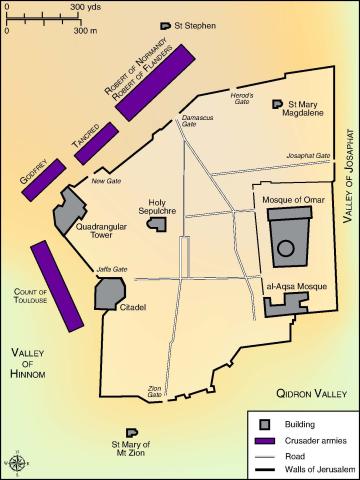The Siege of Jerusalem
[10.37.4] Cum autem tenērent nostrōs iam inclūsōs, quī omnēs putābant morī, vēnit aliīs quīdam nūntius, dīcēns Raimundō Pilētō: “Quid hīc astās cum hīs mīlitibus? Ecce omnēs nostrī in nimiā districtiōne Ārabum et Turcōrum ac Saracēnōrum sunt; et forsitan in hāc hōrā omnēs mortuī sunt. Succurrite ergō illīs, succurrite!” Audientēs nostrī haec, statim cucurrērunt celerī cursū, et festīnanter pervēnērunt usque ad illōs, proeliandō. Pāgānōrum vērō gēns vidēns Chrīstī mīlitēs, dīvīsit sē; et fēcērunt duo agmina. Nostrī autem, invocātō Chrīstī nōmine, tam ācriter invāsērunt illōs incrēdulōs ut quisque mīles prōsterneret suum. Videntēs vērō illī quod nōn possent stāre ante Francōrum fortitūdinem, timōre nimiō perterritī, vertērunt scapulās retrō. Quōs nostrī persequentēs ferē per spatia quāttuor milium occīdērunt multōs ex eīs, ūnumque retinuērunt vīvum, quī nova eīs per ōrdinem dīceret; retinuērunt quoque centum et trēs equōs.
[10.37.5] In eādem obsidiōne, tantā oppressiōne sitis fuimus gravātī, ut suērēmus coria boum et būfalōrum, in quibus dēferēbāmus aquās ferē per spatium sex mīliāriōrum. Ex illīs quippe vāsculīs foetidā ūtēbāmur aquā, et, quantum ex olidā aquā et hordeāceō pāne, in nimiā districtiōne et afflīctiōne erāmus cotīdiē. Saracēnī namque, in cūnctīs fontibus et aquīs latentēs, īnsidiābantur nostrīs, eōsque ubīque occīdēbant et dīlaniābant, animālia quoque sēcum in suās cavernās et spēluncās dēdūcēbant.
notes
(June 1099) A messenger comes to the main crusader contingent and urges them to help their comrades. They attack the Arabs, who now have to fight on two fronts. The crusaders rout the Arabs and kill many, though they keep one alive to give them information.
Meanwhile, the besiegers are afflicted by a severe shortage of water, which they have bring from six miles away. The water is disgusting and the bread is poor. Their plight is made worse by ambushes by Saracens, who kill crusaders and take awy their transport animals.
10.37.4
Cum autem tenērent nostrōs iam inclūsōs: the subject is the Arabs.
ut quisque mīles prōsterneret suum: each crusader defeated his opponent.
quī nova eīs per ōrdinem dīceret: so that he could be an informant; literally “so that he could tell the news in an organized fashion.”
10.37.5
foetidā ūtēbāmur aquā: “we had disgusting water.”
quantum ex olidā aquā et hordeāceō pāne: “because of both stinking water and bread made from barley.”
animālia quoque sēcum in suās cavernās et spēluncās dēdūcēbant: Taking the crusaders' animals presumably makes transport of water even more difficult. The information that the animals were hidden seems anticlimactic, but is perhaps a colorful detail.
vocabulary
10.73.4
astō astāre astitī: to stand by
districtiō –ōnis, f.: a stretching out, hindrance, difficulty
succurrō succurrere succurrī succursum: to run to help; assist, aid
prōsternō prōsternere prōstrāvī prōstrātum: to strew before, spread out, ruin
scapulae –ārum, f.: pl.; shoulders, back
10.37.5
obsidiō –ōnis, f.: siege.
sitis sitis, f.: thirst
suō suere suī sūtum: to sew up
corium –(i)ī, n.: skin, hide, leather
bōs bovis, m./f.: ox, cow
būfalus –ī, m.: antelope, gazelle; (ML) water buffalo
mīliārium –(i)ī, n.: milestone; mile
vāsculum –ī, n.: a small vessel
foetidus –a –um: dank, disgusting, fetid
ūtor ūtī ūsus: to make use of, use (+ abl.)
olidus –a –um: smelling, rank
hordeāceus –a –um: of barley
dīlaniō (1): to tear to pieces
spelunca –ae, f.: a cave

